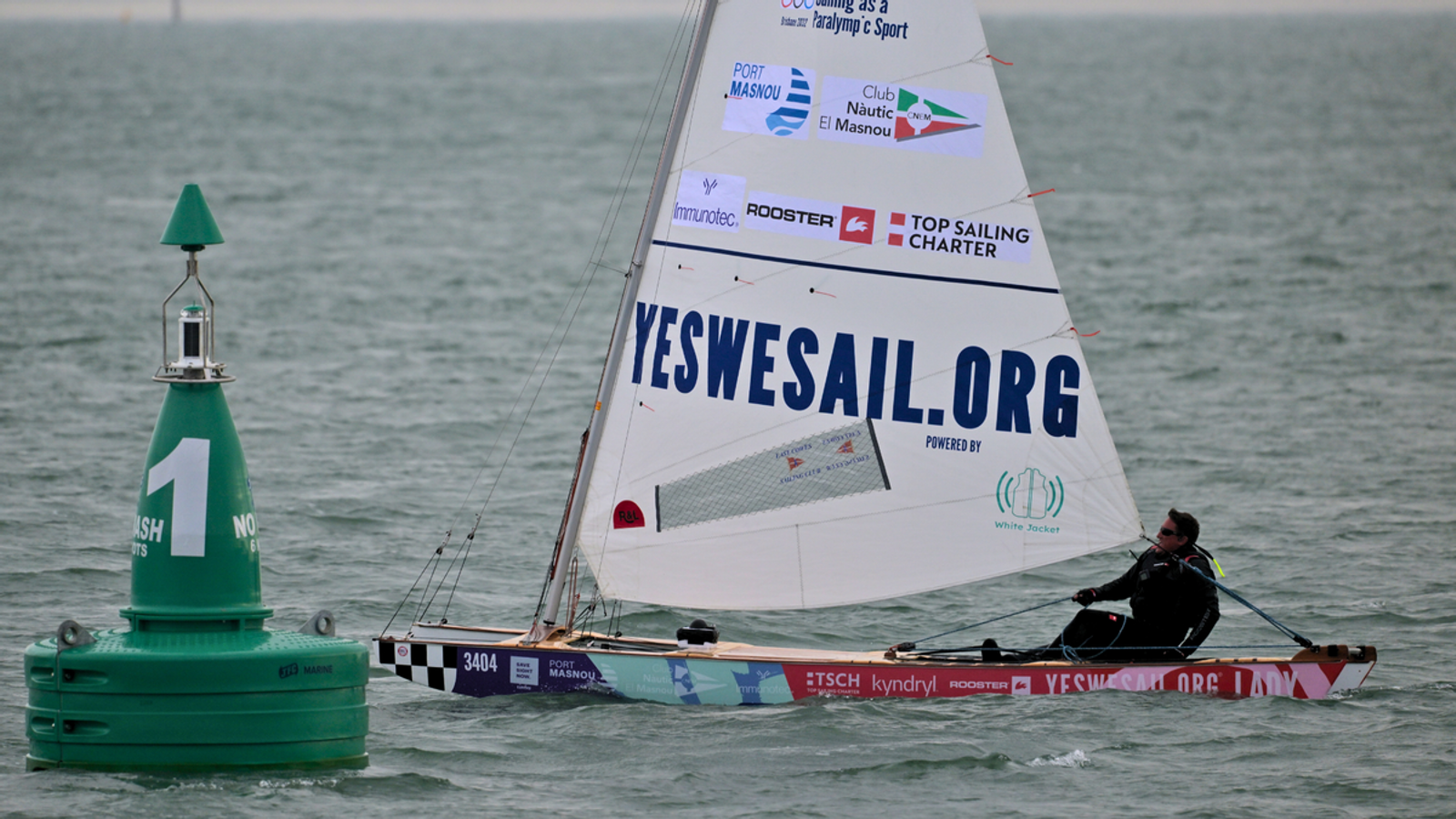The Catalan sailor who has proven that he can sail solo despite being blind
Dani Anglada, blinded after an offshore accident, has traveled around the Isle of Wight to test a method he wants to bring to the Paralympic Games.


Barcelona13 hours and 8 minutes of uninterrupted sailing just to circumnavigate the Isle of Wight, in the south of the United Kingdom. And doing so on a Catalan dinghy, a small boat that had never circumnavigated this island the size of Menorca, but with very tricky Atlantic currents. More than 13 hours alone on this sailing dinghy, barely 5.6 meters long and without a rudder, steered only by the body, the mast, and the sail. An adventure few sailors can undertake, but one that Dani Anglada Pich (Barcelona, 1986) has managed to complete. If doing so is already complicated, in his case it is even more impressive, since Dani is blind.
"The sea has always been present in my life. My father, you could say, was a Sunday sailor. He liked to go sailing on the weekends, and when I was six, he started teaching me. I signed up for a summer camp in El Masnou, where I started to bring the optimists. And I sailed, but I saw sailing, but I saw that I had to do nothing. I learned all the ins and outs of sailing," he recalls. So he trained to be a merchant seaman and nautical engineer at the Barcelona Nautical School (UPC), making his dream come true. "In 2018, I was working on a 300-meter ship transporting liquefied gas. On January 11 of that year, I had an accident on board: a fire extinguisher exploded in my face. And I went blind," he explains. It wasn't easy. "A lot of pain and many visits to doctors until I understood there was no solution. I wouldn't recover my sight. They told me to accept it, but it's hard. On January 6, 2019, a year after the accident, I attempted suicide. I was severely depressed. That's when I realized I had to take action.
And he thought about what beautiful things he could do. "Thinking about reasons to live, I immediately thought about the sea. The sea has taken many things from me, but it has also given me. So I decided to return to sailing, but I discovered that things weren't very good for the blind. I didn't like the way it was set up. There was no respect for people, since they aren't given the side where they are given autonomy. Whether you stretch a rope or do something. But I knew a lot about sailing. Perhaps more than the guides.
So she decided not to complain and take action. "And I created my sailing protocol for people who can't see. So they can be independent. I wanted a therapeutic tool, because sailing gives confidence. Thus, the Yes We Sail project was born." –explains–. It was clear to me that little information was needed, but clear and concise. Information that can be understood quickly. And then, hearing things: the wind in your face, how the boat moves, the waves... First I thought about a whistle giving orders, but the sound doesn't always reach you. Then a megaphone, an earpiece... I kept thinking about how to do it. And finally I saw that the key was vibration. It involves wearing a sensor on your chest that wraps around your body, equipped with 12 sensors that generate vibration patterns, a perceptible language that indicates the course toward the buoy or, on demand, the direction of the wind relative to the bow. You sail with a watchman on another boat, but we are in the process of working with cameras that allow you to gain autonomy. That detect if another boat appears blocking your path and force you to change course at the last minute," he reasons. "It's just the beginning; we're working on the first prototype. But we will continue to improve it," Anglada adds.
And all this, based in the place where he fell in love with sailing, in El Masnou. The yacht club and the port of Maresme have joined his campaign. The idea is for the port of El Masnou to become a reference point for sailing for the blind, thanks to the inclusive sailing projects they already have. start-up Catalan White Jacket has helped him with the technology. Dani has also received support from ONCE and the Isidre Esteve Foundation. The wind was blowing in his favor, as it was the months leading up to the 2024 America's Cup sailing competition in Barcelona. And Dani Anglada was able to meet the competition's leader, New Zealander Grant Dalton. "It turned out he was the skipper of an association of blind sailors in Auckland. I explained to him what I wanted to do, and he believed in me. He opened doors for me, introducing me to people... and since it was during the Cup, I had the idea of going back to where it all began, to the Isle of Wight, to demonstrate that my project was viable," he reasons. In 1851, a sailing competition on the island gave rise to the America's Cup, the longest-running sailing competition. Wight is a place respected by everyone who loves sailing.
Once on British soil, Dani received support from journalist and yachtsman Magnus Wheatley and Simon Rogers, three-time champion of the annual circumnavigation of the island. The East Cowes Sailing Club let him use the facilities. And on July 24th at 8:01 a.m., a cannon shot rang out. This is tradition: it's the Royal Yacht Squadron's trademark. In Wight, when someone announces they'll circumnavigate the island, the cannon fires. It's a highly respected spot among sailing enthusiasts.
However, circumnavigating the island by sea is not easy. On the first leg, speeds of up to 12 knots were reached, before having to venture more than eight miles into the English Channel in search of wind. He sailed for more than six hours on open sea until reaching St. Catherine's Lighthouse, and on the final leg, he faced his toughest challenge: the Bembridge area, with cross seas, strong gusts of wind, and a complicated change of tide. "There were moments of excitement and fear; I didn't know if I could make it. The sea was very rough, it was very difficult to navigate. Also, a sailboat is small; it's not a boat like the ones that usually sail there. It moved a lot, but it held up. And I gritted my teeth and pulled through. When I achieved it, it was the first thing I'd achieved, the first thing I'd achieved." As he crossed the finish line just after nine at night, he was validating his navigation protocol. "It's not just a sporting challenge; it's proof that there are no disabilities, just different abilities. With the right protocols, technology, and preparation, anything is possible," he argues.
The success on the Isle of Wight has been just another step in a long-distance race. Dani is in contact with the Catalan, Spanish, and international sailing federations to ensure that sailing incorporates his ideas. "From 1992 to 2016, sailing for the blind was a Paralympic sport. After that, it was dropped from the program. And if you're not in the Games, you receive less support. My goal is to be back at the Brisbane 2032 Paralympic Games. We're doing a great job, and I'm optimistic," he says. His journey continues unabated.
